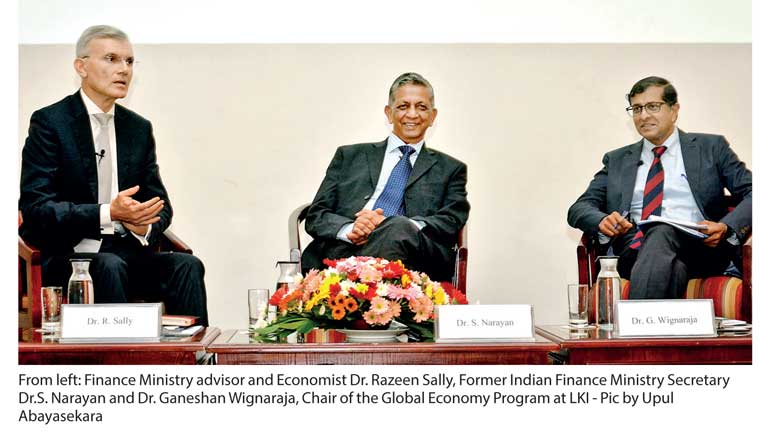Saturday Feb 21, 2026
Saturday Feb 21, 2026
Tuesday, 21 November 2017 00:00 - - {{hitsCtrl.values.hits}}

By Uditha Jayasinghe
Indo-Sri Lanka trade would benefit if negotiations shifted from tariff lines to non-tariff barriers, a top official said yesterday, as it would tackle practical constraints on trade.
Former Indian Finance Ministry Secretary Dr. S. Narayan, speaking at the Lakshman Kadirgamar Institute, pointed out that Sri Lankan exports to India had grown significantly over the past few years with local companies creating a name for themselves in small but significant segments of the market. Dr. Narayan pointed out that when it came to items such as furniture, glass, apparel and even sausages, Indian companies have had to upgrade their production to meet Sri Lankan standards.
For this trend to grow Sri Lankan companies should have better access to ports and methods to get past regulatory bottlenecks, he said. Sri Lankan exports are also disproportionately focused on Tamil Nadu trade and would do better to broaden their market to other South Indian states, especially coastal states that could provide companies with better access points and more competitive business environments.
“I think it is important to move away from the big picture and focus on the more business picture and deal with issues that face businesses and not governments,” he said.
Dr. Narayan also focused on the informal trade, mostly done by small boats, off the South Indian coast that brings cement, automobile parts, steel and other items to Sri Lanka. He suggested that it would be positive to have this trade formalised so that legitimate businesses could then be assisted to expand it and issues such as corruption or smuggling could be minimised.
He also applauded the new Goods and Services Tax (GST) implemented by the Modi Government as increasing the number of companies in the formal sector but acknowledged it would have teething issues. He noted that Sri Lankan businesses had expressed their approval of the measure and hoped it would pave the way for more trade between the two countries.
GST has also provided an unexpected opportunity for Sri Lankan tech companies if they are open to making use of the proposed Economic and Technology Cooperation Agreement (ETCA). Dr. Narayan pointed out that most of the large tech companies in India were engaged in dealing with the large amount of compliance that GST demanded, which left many small and medium businesses with no one to supply their tech and accounting needs. Imaginative Sri Lankan tech companies could easily step into this gap and find a willing market.
Finance Ministry advisor and Economist Dr. Razeen Sally, who is supportive of liberalisation, participating in the discussion said the Government would use both legislation and policy to assist businesses adjust to a more open economy. Anti-dumping legislation, expected to be passed in Parliament in the next few months, would create a more rules-based environment for trade, he said, adding that the Government’s trade adjustment package would assist vulnerable companies.
However, the Government should ensure the funds for the trade adjustment package should not go into the pockets of prominent businessmen but rather to re-skill and re-tool the workforce so they can build new types of businesses and find new jobs in a changed economic environment.
Dr. Sally also called for more investment from India to counter growing Chinese investment in Sri Lanka. Liberalisation from the labour sector was also advocated by him as a way to increase skills in Sri Lanka and effect knowledge transfer to boost growth.